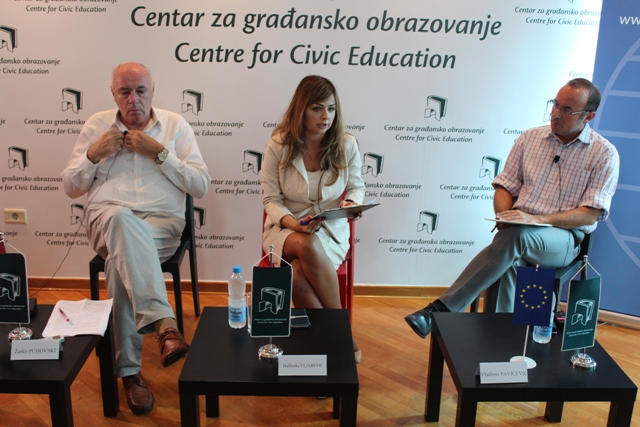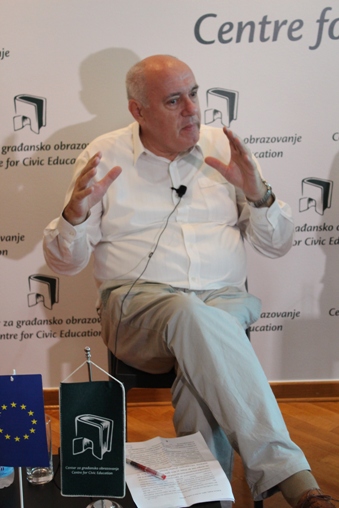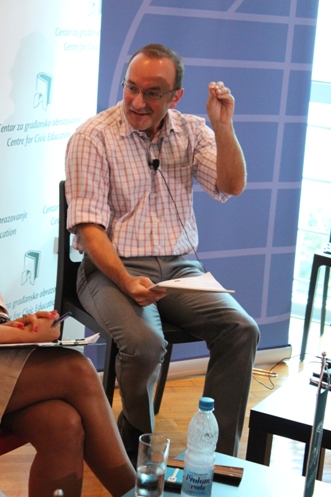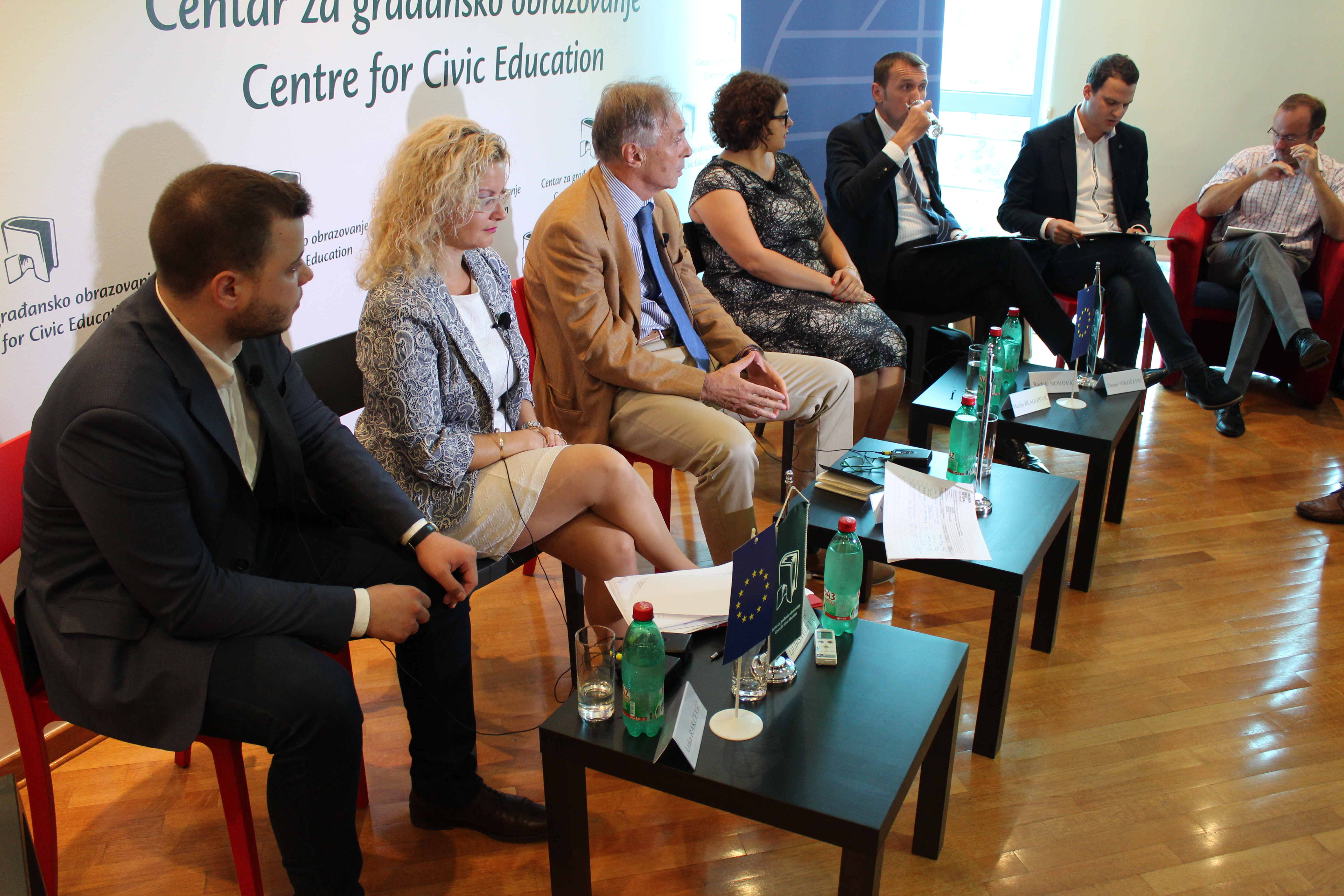Centre for Civic Education (CCE) and Friedrich Ebert Stiftung (FES) organised a conference today titled: “Consolidating European values in Montenegro”.
By opening the event, Daliborka Uljarević, CCE executive director, pointed out that “Process of European integration undoubtedly carries an enormous power of transformation which can be seen in Montenegrin society, but it remains to be seen who is propelling the process of reforms and who is impeding it”, thereby estimating that “NGOs and media, i.e. the civil society in its broadest sense, were more willing to address some of the key matters that make the focus of negotiating chapters, compared to the political parties”. She further emphasised: “So far, we had a great level of compliance of programmes and commitment of political parties concerning European integration, and with the approaching elections we are just now identifying the sense of Euroscepticism through the expressions of certain political groups. Furthermore, we see that those who rhetorically advocate European values through their programmes do not cherish the same through public discourse and their practice, especially when it comes to respect of rule of law and diversity of opinion”, Uljarević estimated.
Prof. dr Žarko Puhovski, from the University in Zagreb, told that candidate states assume what are European values, while in reality they do not keep track of current affairs, thereby estimating that: “Nowadays, European values are essentially amidst the crisis. In addition, should the disastrous “triad” come in place – Brexit, Trump’s victory, and Marine Le Pen’s victory – we will witness a completely different state of affairs”. He also stated that “European Union always stood for less borders, greater mobility, and we are the only ones who see it as the opposite”. Puhovski questioned the benefits and the losses in negotiations, hence emphasising that politicians constantly speak about negotiations while the reality is about the “homework” sent from Brussels, with “only 5% of actual negotiations, while the rest is adopted”. In further remarks, he told that there are different relations toward the EU, or that “we have Europhiles, Europhobes and Eurosceptics”, whereby he pointed out that “the only regular position of eurosceptics is where they actually do not oppose the EU, but rather critically consider the conditions according to which the EU operates”. Finally, he concluded that most important is to analyse the extent to which the political parties foster democratic values, pointing out that “there is a threefold pressure on political parties in candidate states – to accept the critical positive view towards the European Union, to position themselves in the context of European timetables and to accept the democratic practices of party-functioning.”
Prof. Vladimir Pavićević, PhD, from the University in Belgrade, analysed the (in)existence of European values in political parties of Serbia through three benchmarks: “decision-making process in parties, creation of public policies by the parties and membership in international organisations of political parties which coincide ideologically”. Through the examples in Serbia, he estimated that “the situation has not improved in Serbia in the part of democratisation of parties, and that prior to coming to power, political parties do not consider the amendments of certain policies or provide specific solutions”. He illustrated the third example by referring to the fact that none of the parties-in-power in Serbia are fully fledged members of a single international forum: “This entire time they failed to formalise what should have united them in Europe through the system of ideas, ideals, values and opinions, which is unbelievable”, Pavićević assessed and added that “there is no tendency in Serbian parties to act as contemporary political parties”.
Miodrag Lekić, president of DEMOS, underlined that “Montenegro is, in fact, an old state, but a relatively young democracy”. He confirmed that there is a correlation between the internal organisation of political actors with their potential to run the state. “Authoritarian, corrupt party with criminal groups cannot transform into a subtly-democratic one and run the state as such”, Lekić stated. He also assessed that European values in Montenegro are still not sufficiently understood, as well as that the “euro-indifferent groups are the most dangerous”. By analysing the state of affairs at the Montenegrin political scene, Lekić concluded that “we have mastered the European rhetoric, not the practice.” He is convinced that process of integration in relation to Brussels will last longer, considering that emersion of authoritarian leaders who still reign the region. “I remain firmly convinced in terms of the regularity of European integration of Montenegro, which acts as the centripetal force in Montenegro, and political Montenegro must integrate in system of parties in Europe”, Lekić emphasised.
Mirel Radić Ljubisavljević, vice president of Social-democratic party (SDP) of Montenegro, pointed out that her party “was in power for almost two decades in order to achieve its programme goals, namely to restore the independence of Montenegro, open the European path and NATO integration, and when these goals were achieved, party decided not to be the slave of ruling party’s will”. She added: “We wanted an independent Montenegro not a private state, and we could not participate any longer in a government with captured institutions”. Radić Ljubisavljević concluded that “consolidation of European values makes us better and we are sure that we would not be fighting organised crime had there not been for initiation of process of integration”.
Radule Novović, member of Executive board of Democratic Party of Socialists (DPS), reminded of the “importance of integration which should lead to an increase in GDP, and that European integration is not an expressionless phraseology for this party”. He then presented the election programme of DPS for parliamentary elections in detail.
Marija Blagojević, member of Presidency of Social-democrats (SD) of Montenegro, discussed the crisis of left-winged parties on a wider level and pointed out that “future of Montenegro lies in redefining the political parties”. “All of us surely have something that we would like to change about our parties, in terms of procedures, however, I see political parties as any other organisation – relying on human power and people who gather around certain idea”, Blagojević clarified. She concluded that politics is a subject of constant changes.
Luka Rakčević, member of Coordinating committee of United Reform Action (URA), reminded that political parties have some inherited issues which must be dealt with, but also of the important role of parliament and its initiatives in the world, unlike Montenegro where such parliamentary dynamics was marked as “parliamentary dictatorship” at one point. “Since the beginning of nineties, amid the weakening of parties and syndicates, the focus in Montenegro was on the issues of identity, ethno-national or differences that were blown out of the proportion. A cultural pattern was imposed in Montenegro which emphasised the issue of barely visible differences in the identity, rather than highly visible class differences” he estimated.
Conference gathered more than 30 representatives of political parties, NGOs, media and diplomatic corps. There discussed also about women’s participation on lists of political parties, views of political parties in relation to LGBT issues, models which political parties propose in direction of the improvement of economic conditions in which the citizens of Montenegro live, and etc.
Svetlana Pešić, programme associate




